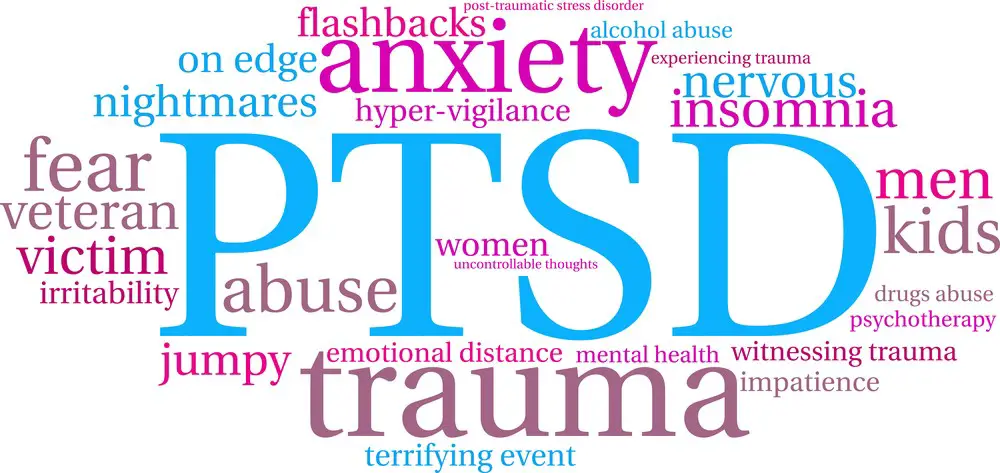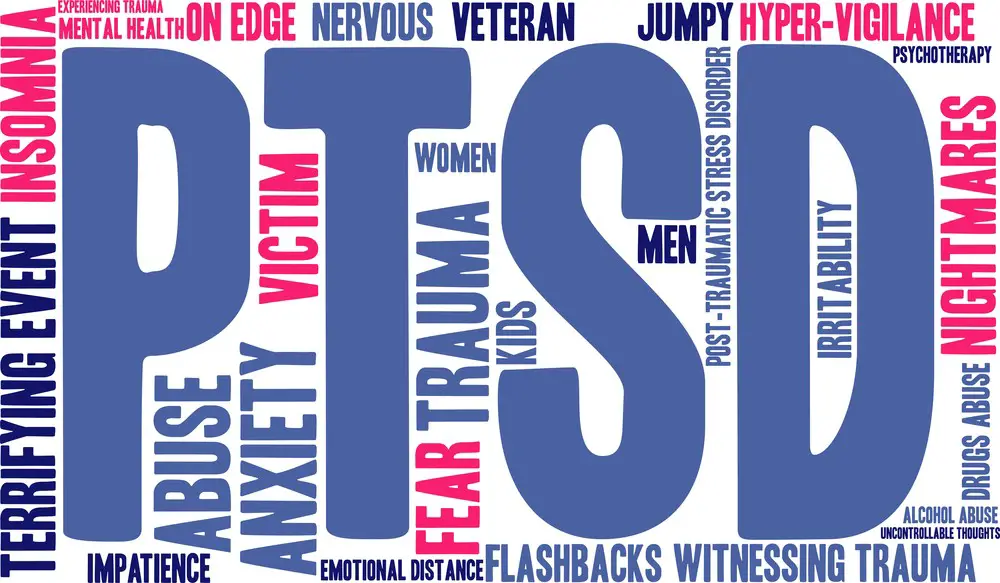As a BetterHelp affiliate, we receive compensation from BetterHelp if you purchase products or services through the links provided
Anxiety disorders and PTSD symptoms are often conflated, making it difficult for people who have to effectively communicate with their loved ones, get an accurate diagnosis, or even evaluate their symptoms properly. So what’s the difference between Anxiety and PTSD?
Anxiety disorders such as panic disorder, generalized anxiety disorder, and phobias are prevalent among young adults. On the other hand, post-traumatic stress disorder is brought on by a prior traumatic event.
Given how crucial mental health issues are in today’s world, it’s essential to address the similar symptoms of anxiety disorders and PTSD to see how they are similar and different. Therefore, the rest of this article will discuss the differences in the origins, symptoms, and treatment of PTSD.

Anxiety vs. PTSD – How We’ll Compare Them
PTSD and anxiety share similar symptoms, so it’s essential to compare them by the same metrics so that you or your loved one can recognize and address the behaviors associated with either mental health condition.
We’ll be looking at what causes the onset of anxiety and PTSD based on diagnostic criteria, the symptoms associated with the two mental health issues, and the best course of treatment for each.
Onset
PTSD and anxiety can both occur as a response to a particular event that caused them trauma, such as a severe accident or natural disaster. Still, anxiety disorders can also occur over several years.

Anxiety Causes
Anxiety is a natural part of life, but for those with anxiety disorders, anxiety symptoms are much more pronounced to the point that it becomes a concerning mental health condition.
Examples of anxiety disorders include generalized anxiety disorder, social anxiety disorder, specific phobias, and separation anxiety disorder. These can co-occur with one another, as well as with various other social anxiety disorders.
Often, anxiety disorders can be genetic. Anxiety appears to run in families, likely due to the biological factors transmitted from one generation to the next.
Brain chemistry imbalances are a common cause of anxiety, with research suggesting that people who suffer from anxiety often have problems with crucial neurotransmitters in the brain.
Abnormalities in blood flow and brain metabolism are also potentially associated with anxiety-related disorders. Anxiety can also be brought on by various diseases and illnesses that disrupt brain chemistry.
Environmental causes such as stress, upbringing, a traumatic experience, abuse, or diet can all contribute to the onset or perpetuation of anxiety-related disorders.

PTSD Causes
PTSD can co-occur with anxiety. PTSD can cause or correlate with other disorders under the anxiety umbrella. For PTSD as a mental illness, however, the main difference is the root cause.
People generally develop PTSD as a response to trauma. The trauma may have been experienced directly or witnessed. People with PTSD may also have learned that the severe injury happened to a friend or family member. These traumatic events are the primary cause of post-traumatic stress disorder.
Symptoms
The difference between anxiety and PTSD usually confuses people because the physical symptoms are often quite similar, making it hard for people to understand these two mental health disorders. In addition, people experiencing PTSD generally experience anxiety symptoms as well, which makes it easy to conflate the two at times.

Anxiety Symptoms
People with anxiety disorders have widely varying symptoms that are influenced by several factors of the disorder. For example, people with a general anxiety disorder may have difficulty sleeping, difficulty concentrating, negative thoughts, and prolonged stress.
They also tend to feel anxious more often than others and, depending on the severity of the disorder, may experience panic attacks.
Different anxiety disorders cause people to exhibit specific coping mechanisms, such as obsessive-compulsive disorder. Stress can also lead to panic disorder, which can cause episodes of intense anxiety, fear, or terror, generally over a few minutes, creating horrible bodily sensations.
People with panic disorders usually experience prolonged stress regarding their mental health due to the fear of the traumatic event happening again.
PTSD Symptoms
As the name suggests, post-traumatic stress disorder occurs due to a traumatic event, and the resulting symptoms can be broken down into four categories.
- Intrusion symptoms
- Avoidance symptoms
- Adverse changes in mood and cognition
- Arousal symptoms
Intrusion symptoms associated with PTSD are recurrent or vivid flashbacks or memories of the individual or individuals suffering from the traumatic event.
These common PTSD symptoms can be brought on by cues or triggers that remind the affected person of the traumatic event.
Avoidance symptoms occur when the person with the disorder actively avoids reminders of the traumatic event or tries to block out thinking about the event.
The trauma of the event that led to the traumatic stress disorder can also result in common symptoms such as negative mood changes, negative views of oneself or the world, blaming, detachment from loved ones, or inability to experience positive emotions.
These PTSD symptoms can lead to depression and depressive disorders, as well as potentially causing the onset of generalized anxiety disorder.
Arousal symptoms can also occur in response to the trauma or depression caused by other factors. These include irritability, self-destructive behavior, hyperattentive behavior, trouble concentrating, and difficulty sleeping.
You may recognize some of these as being similar to generalized anxiety disorder. However, the critical difference is that PTSD often comes with dissociative symptoms that can affect the person differently.

Treatment
The proper treatment makes all the difference in helping people with either generalized anxiety disorder GAD or post-traumatic stress disorder PTSD.
Anxiety Treatment
Some forms of anxiety can be treated or have their symptoms reduced by only treatment. Psychotherapy, or psychological counseling, is an effective treatment for anxiety. Cognitive behavioral therapy relies on teaching you specific coping skills to reduce your anxiety and manage the onset of anxiety.
In some instances where there is a biological or genetic component causing the anxiety to interfere with daily tasks, potentially leading to depression or other depressive disorders, medications can be helpful.
Antidepressants and anti-anxiety medications can help resolve some issues with malfunctioning neurotransmitters, potentially reducing symptoms of anxiety disorders.
In some circumstances, a doctor may prescribe other medications like sedatives, which can provide short-term relief for anxiety.
A doctor will likely recommend lifestyle changes to reduce anxiety, such as developing a regular exercise routine, avoiding alcohol and substance abuse, stress management techniques, and dietary changes.
PTSD Treatment
PTSD treatment usually relies on medication, therapy, and self-care to address mental health concerns. As with generalized anxiety disorder, cognitive behavioral therapy is quite effective at treating PTSD.
It helps the affected person focus on the relationships among their thoughts, feelings, and behaviors, as well as attempting to change behavioral patterns causing symptoms such as difficulty concentrating.
Cognitive processing therapy is a sub-practice of cognitive behavioral therapy. It helps patients learn how to modify their thoughts and unhelpful ideas that could be causing the affected person undue stress.
Prolonged exposure helps those affected with PTSD to revisit and gradually accept dormant memories and situations that may be causing them distress. In addition, facing these fears can help the person reduce stress and anxiety when pressed with unpleasant memories.
The relationship between the therapist and the patient is significant regardless of the conditioning used. The suffering individual must trust their therapist for the best chance of recovering from or at least reducing the effects of PTSD.
Certain medications also offer positive effects in PTSD cases. For example, selective serotonin reuptake inhibitors (SSRI) are sometimes used selectively and on a case-by-case basis. The duration of medication and the dosage are significant to ensuring the best results.
For those suffering from major depressive disorder and PTSD, Venlafaxine is often prescribed daily to balance serotonin neurotransmission, providing benefits to those experiencing PTSD.
The Breakdown
Anxiety disorders and PTSD can often have very similar behaviors, and the two can co-occur in individuals who have experienced trauma in their lives. Here’s a breakdown of all the differences between the two.
| Anxiety Disorders | PTSD | |
| Cause | Biological or genetic factors; life experiences, or environmental factors | Experiencing, witnessing, or hearing about a traumatic event |
| Symptoms | Heightened sense of anxiety, increased stress, coping behaviors, and negative emotions. | Intrusive thoughts or memories of the traumatic event, avoidance of talking about or thinking about the event, heightened stress, detachment, and destructive behaviors. |
| Treatment | Medication, cognitive behavioral therapy, lifestyle changes | Medication and cognitive behavioral therapy |
Final Thoughts
Both anxiety disorders and PTSD are troubling to live with and can cause a lot of stress for those experiencing either mental health condition.
Consider seeking counsel if you or a loved one are experiencing increased anxiety interfering with your daily life. Online therapy is straightforward, effective, and much less expensive than traditional in-person therapy, making seeking help with anxiety or PTSD disorders easier.
- Stress Management: What is the Relationship Between Stress and Addiction? - June 28, 2024
- Exploring Techniques to Maintain a Healthy Lifestyle without Drugs - May 28, 2024
- How Acupuncture Helps Treat Chronic Fatigue Syndrome - May 28, 2024
This site contains affiliate links to products. We will receive a commission for purchases made through these links.




